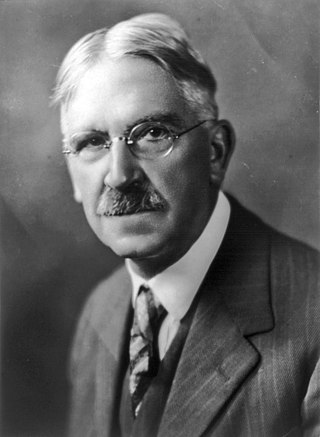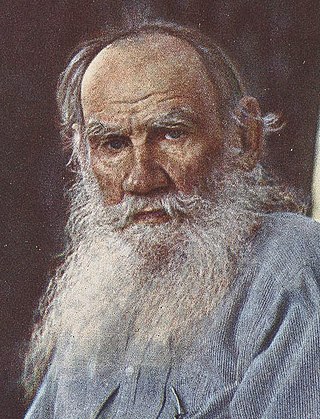Progressive education, or educational progressivism, is a pedagogical movement that began in the late 19th century and has persisted in various forms to the present. In Europe, progressive education took the form of the New Education Movement. The term progressive was engaged to distinguish this education from the traditional curricula of the 19th century, which was rooted in classical preparation for the early-industrial university and strongly differentiated by social class. By contrast, progressive education finds its roots in modern, post-industrial experience. Most progressive education programs have these qualities in common:
Educational perennialism is a normative educational philosophy. Perennialists believe that the priority of education should be to teach principles that have persisted for centuries, not facts. Since people are human, one should teach first about humans, rather than machines or techniques, and about liberal, rather than vocational, topics.
Educational psychology is the branch of psychology concerned with the scientific study of human learning. The study of learning processes, from both cognitive and behavioral perspectives, allows researchers to understand individual differences in intelligence, cognitive development, affect, motivation, self-regulation, and self-concept, as well as their role in learning. The field of educational psychology relies heavily on quantitative methods, including testing and measurement, to enhance educational activities related to instructional design, classroom management, and assessment, which serve to facilitate learning processes in various educational settings across the lifespan.

John Dewey was an American philosopher, psychologist, and educational reformer. He was one of the most prominent American scholars in the first half of the twentieth century.
The philosophy of education is the branch of applied philosophy that investigates the nature of education as well as its aims and problems. It also examines the concepts and presuppositions of education theories. It is an interdisciplinary field that draws inspiration from various disciplines both within and outside philosophy, like ethics, political philosophy, psychology, and sociology. Many of its theories focus specifically on education in schools but it also encompasses other forms of education. Its theories are often divided into descriptive theories, which provide a value-neutral description of what education is, and normative theories, which investigate how education should be practiced.

Johann Friedrich Herbart was a German philosopher, psychologist and founder of pedagogy as an academic discipline.

Pedagogy, most commonly understood as the approach to teaching, is the theory and practice of learning, and how this process influences, and is influenced by, the social, political, and psychological development of learners. Pedagogy, taken as an academic discipline, is the study of how knowledge and skills are imparted in an educational context, and it considers the interactions that take place during learning. Both the theory and practice of pedagogy vary greatly as they reflect different social, political, and cultural contexts.

Experiential education is a philosophy of education that describes the process that occurs between a teacher and student that infuses direct experience with the learning environment and content. This concept is distinct from experiential learning, however experiential learning is a subfield and operates under the methodologies associated with experiential education. The Association for Experiential Education regards experiential education as "a philosophy that informs many methodologies in which educators purposefully engage with learners in direct experience and focused reflection in order to increase knowledge, develop skills, clarify values, and develop people's capacity to contribute to their communities". Experiential education is the term for the philosophy and educational progressivism is the movement which it informed. The Journal of Experiential Education publishes peer-reviewed empirical and theoretical academic research within the field.
Critical pedagogy is a philosophy of education and social movement that developed and applied concepts from critical theory and related traditions to the field of education and the study of culture.
Holistic education is a movement in education that seeks to engage all aspects of the learner, including mind, body, and spirit. Its philosophy, which is also identified as holistic learning theory, is based on the premise that each person finds identity, meaning, and purpose in life through connections to their local community, to the natural world, and to humanitarian values such as compassion and peace.
Social learning is learning that takes place at a wider scale than individual or group learning, up to a societal scale, through social interaction between peers.
Values education is the process by which people give moral values to each other. According to Powney et al. It can be an activity that can take place in any human organisation. During which people are assisted by others, who may be older, in a condition experienced to make explicit our ethics in order to assess the effectiveness of these values and associated behaviour for their own and others' long term well-being, and to reflect on and acquire other values and behaviour which they recognise as being more effective for long term well-being of self and others. There is a difference between literacy and education.

Russian philosophy is a collective name for the philosophical heritage of Russian thinkers.

Count Lev Nikolayevich Tolstoy, usually referred to in English as Leo Tolstoy, was a Russian writer. He is regarded as one of the greatest and most influential authors of all time. He received nominations for the Nobel Prize in Literature every year from 1902 to 1906 and for the Nobel Peace Prize in 1901, 1902, and 1909.
Sri Aurobindo International School, Hyderabad is a school located in Hyderabad, Telangana. The main campus is located in Vidyanagar, Osmania University road and its affiliated to ICSE board, it offers education from Nursery to 10+2, their other campus which is located in Jangaon which is around 90 KMS from Uppal(Hyderabad). This Jangaon campus is residential school where class IV to Class IX is offered and its affiliated to CBSE board. The school is well-known for not requiring students to wear uniforms because they value the uniqueness of each child. The school is named in honor of philosopher Sri Aurobindo.
Anarchism has had a special interest on the issue of education from the works of William Godwin and Max Stirner onwards.

The Ignatian pedagogical paradigm is a way of learning and a method of teaching taken from the Spiritual Exercises of Ignatius of Loyola. It is based in St. Ignatius Loyola's Spiritual Exercises, and takes a holistic view of the world.
Science of Education is a book written by the German empiricist Johann Friedrich Herbart. It was first published in German in 1806 and the first English printing was in 1902. Herbart emphasized education as the way for an individual to fulfill his potential and created a scientific method to help him do so. The Science of Education advocated a five-step methodology that appeals to learner’s interests and applies content back to morals and daily life. Teachers can be found in Germany, England, and the United States who are still implementing this pedagogy today.
The Ferrer school was an early 20th century libertarian school inspired by the anarchist pedagogy of Francisco Ferrer. He was a proponent of rationalist, secular education that emphasized reason, dignity, self-reliance, and scientific observation, as opposed to the ecclesiastical and dogmatic standard Spanish curriculum of the period. Ferrer's teachings followed in a tradition of rationalist and romantic education philosophy, and 19th century extragovernment, secular Spanish schools. He was particularly influenced by Paul Robin's orphanage at Cempuis.

Muhammad Iqbal (1877–1938) was a prolific writer who authored many works covering various fields and genres such as poetry, philosophy and mysticism. He expressed his ideas in many forms and this article deals with his educational philosophy. His philosophy has tremendous significance not only for Pakistan educational system, but also for the entire world. His basic concept of education is based on the teaching of the Quran. To him the superior, reliable and faultless source of knowledge is only this one. His whole educational thought is based and revolves on his concept of Khudi. He had a unique concept of education that carries the vital significance being the contribution of both modern and ancient thoughts. His well balanced thoughts are based upon the strong roots of Islamic teachings on one side and being progressive and coping with the modern scientific age on the other side. He has been very categorical in expressing his views about the education, its nature, and philosophy in his poetical works, articles and speeches. He also wrote various letters to different people and discussed the educational phenomenon in detail.









